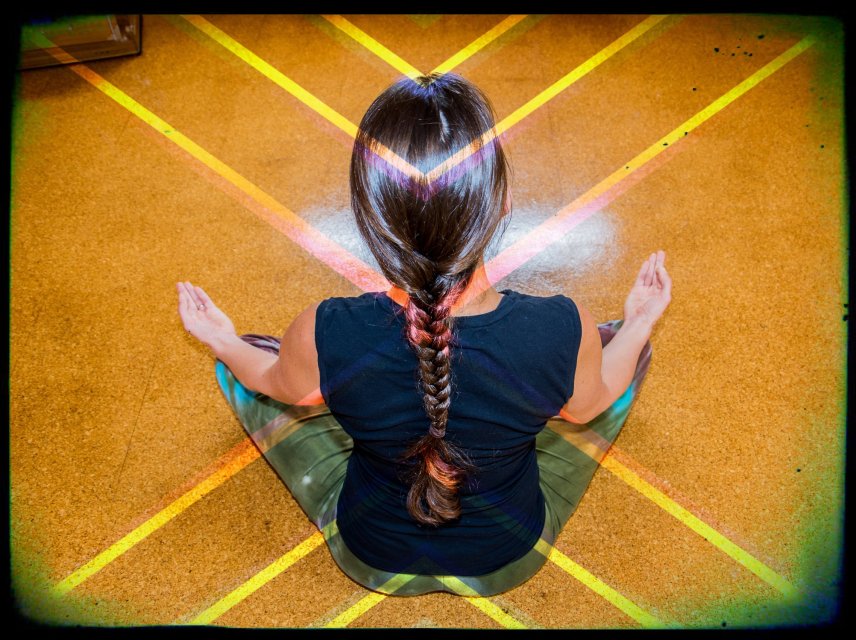Online computer connection creates a challenge to stay connected. Nothing replaces face-to-face connection and contact. It is part of living a healthy life. Now, more than ever, we interact on social media and other forms of online communication. And, just like anything, there are benefits and drawbacks.
Since offering World Peace Yoga classes online in response to COVID-19, I have received feedback that some people are practicing yoga more than ever. Truly music to my ears. We benefit from an amped-up yoga practice at this time and potentially at all times. Why? Because the other side of online interaction is exposure to an infinite amount of opinions and attitudes in regard to what is right and what is wrong.
The Dalai Lama says, “Do not let the behavior of others destroy your inner peace.” How often do you allow the behavior, opinion, belief, attitude, outlook, or view of another get to you and frustrate, anger, and destroy your inner peace? Not only that, but how is that impacting your connection with that individual?
Yoga is about connection. The division is overwhelming. Are we really liking to contribute to more division?
I attended a workshop with author and fellow yogi Peter Block on building community. He said, “like-mindedness is the enemy.” That struck me. Not to say that like-mindedness is “bad,” as it is powerful and energizing to come together in connection with those that share similar values, ideals, and beliefs. At the same time, it is important to be open to different perspectives of those we know and those we don’t know. We don’t have to agree on all perspectives, but we are, at minimum, able to not allow for those different perspectives to divide us and create further separation and disconnection.
To live harmoniously in diverse communities in this incredibly beautiful diverse world, it is essential we learn to commune, connect, and have real and welcoming conversations with each other. As the musician Michael Franti says, “Nobody right, nobody wrong.” This is the essence of yoga philosophy. There is no good or bad or right or wrong. There only is what is. Our practice is to look at things with an equal eye, from a place of equanimity.
Every moment of every day we have thoughts and make choices based on those thoughts. The consequences of those choices are how we show up in the world. The goal of our yoga practice is to have thoughts and choices that are all equanimous. The choices we make are not good or bad or right or wrong; they are expressions of a multitude of potential actions, such as extending kindness and gentleness or viciousness and cruelty.
When from a place of equanimity, all of our thoughts, words, and actions are not right or wrong or good or bad. And, they do still have consequences. In my most authentic self, I choose thoughts, words, and actions of kindness, compassion, and fearlessness. The choice to be kind, for example, is not good or bad—it is simply what assists me with relating and connecting to a state of wholeness and unity. I make choices that recognize or deny my interconnectedness with all of life. It is a practice after all, not perfection.
When I no longer see anyone or any action as right or wrong, or good or bad, the result of my equanimous thinking is that I unconditionally love everyone. I believe that the qualities of unconditional love, kindness, empathy, and compassion create a greater sense of unity. From a place of equanimity, I am able to realize that all beings are equal and all things are linked through the union of the singularity—we are all one. Equanimity is the experience of undifferentiated consciousness, non-preferential union, or the realization of our interconnectedness with all of life without an attitude of superiority or preference. I relate to the state and experience of yoga being one of equanimous love.
Being equanimous does not mean that we become complacent and do not work for change. A vital part of the yoga practice is spiritual activation (consciousness + action) off the mat. That is, to get involved with advocacy/education/activism based on yogic principles, i.e. ahimsa/ nonviolence, aparigraha/ nongreed, and satya/ truth telling…being of service to create a more peaceful world. Yoga is a tool to empower people to be active in social justice. We immerse ourselves in practices, suh as meditation, for personal growth and healing, while also being keenly aware and involved in the world. Global issues of justice, equality, liberation, and radical inclusion are an equally important part of a yoga practice.
Practicing equanimity does not mean that we avoid sadness or happiness. Sadness and happiness are experienced at a much deeper level when we feel our interconnectedness with all beings and when we participate in actively uplifting the lives of others off the mat. By opening ourselves to deep love and empathy, we feel for others in the same way as if we are personally experiencing their sorrow or happiness. I believe that love and empathy are parts of our natural state. When we are connected to this state of “equanimous love,” unconditional love, and empathy, we sense how to better relate with others, resolve conflicts, create solutions, and live in harmony and peace.
A peaceful world is not necessarily a world without conflict. We’re not looking to live in a world where everyone agrees, where no arguments are made for change, or where we are all the same.
Yes, our essential natures are the same, and we all have our unique gifts and talents to share. All of us vary greatly and progress—and fall down and return stronger, too—in exceptional ways. In a peaceful world, when conflict arises, we are able to handle that conflict in a calm and loving manner. We don’t use violence or manipulation to get our way or to force someone to agree with us. We find healthy ways to compromise, encourage, disagree, and, ultimately, intuit and work together. To live this path, we connect with our unlimited capacities to show love and empathize with others.
I believe we are each born with a boundless capacity to learn, grow, and love. We intuitively know how to be happy, joyful, and live in harmony and peace with all beings and the earth. All the yogic practices of asana, meditation, and so on, remind us of what we already know. And, if you’re anything like me, you are probably able to use some extra reminders at this time where distance, isolation, and lack of face-to-face personal connection is the norm. So, this is your reminder to stay connected. Get out your yoga mat and meditation pillow and practice your practice. Do your part to stay connected both on and off the mat.
Tryin’ to make a point, or have the last word
But most the time people just tryin’ to be heard
They say you got to choose your side and, when it’s done
Nobody right, nobody wrong
It ended in a great big fight and, when it’s done
Nobody right, nobody wrong
Anna Ferguson is the author of World Peace Yoga: Yoga for People Who Breathe, a book on yoga that inspires peace in action, developing intuition, deepening empathy, and expanding compassion. Connect with Anna via Instagram @annafergusonpeace or via Facebook or join her for a class online at worldpeaceyogaonline.com.

